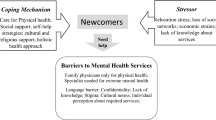Abstract
Background When individuals enter a new community, they face many challenges in terms of adjusting to a new language, different customs and unfamiliar norms. These challenges may result in mental and/or general health problems. Objectives and methods The primary purpose of this study was to ascertain the mental health knowledge of Iranian immigrants and the impact of immigration on the development of mental health problems among these immigrants. Results Participants defined “mental health” in terms of psychological, social and emotional aspects and an absence of mental illnesses. Several immigration-related risk factors, such as lack of English, under- or unemployment, cultural differences, and lack of social support were revealed as barriers to successful acculturation. Conclusions Culturally sensitive and competent programs are needed to understand the needs of Iranian immigrants to be able to design and implement appropriate mental health programs.
Similar content being viewed by others
References
Garousi V. Iranians in Canada: a statistical analysis. 2005. Retrieved June, 2007, from the: http://www.iranian.com/News/2005/June/IraniansCanada.pdf.
Berry JW, Kim U. Acculturation and mental health. In: Dasen P, Berry JW, Sartorius N, editors. Health and cross-cultural psychology. London: Sage; 1988. p. 207–236.
Zheng X, Berry JW. Psychological adaptation of Chinese sojourners in Canada. Inter J Psych. 1991;26(4):451–70.
Ahmadi N, Ahmadi F. Iranian Islam: the concept of the individual. Macmillan Press, London; 1998.
Darvishpour M. Intensified gender conflicts within Iranian families in Sweden. Nora Nordic J Women’s Stud. 1999;7(1):20–33.
Nasehi V. Iranian women and the family abroad. Avaje zan (Women’s voice). 19, Oslo; 1994.
Riessman CK. Narrative analysis. Qualitative research methods series no. 30. Newbury Park, CA: Sage; 1993. p. 54–60.
Momenzadeh S, Posner N. Iranian migrants’ discourses of health and the implications for using standardized health measures with minority groups. J Immig Health. 2003;5(4):173–80.
Westermeyer J, Her C. English fluency and social adjustment among Hmong refugees in Minnesota. J Nervous Mental Dis. 1996;184(2):130–32.
Pernice R, Brooks J. Refugees’ and immigrants’ mental health: association of demographic and post-immigration factors. The J Soc Psych. 1996;136(4):511–9.
Furnham A, Li YH. The psychological adjustment of the Chinese community in Britain: a study of two generations. British J Psych. 1993;162:109–13.
Beck AT. Cognitive therapy. In: Zeig JK, editor. The evolution of psychotherapy. New York: Brunner/Mazel; 1987.
Nidoo JC. The mental health of visible ethnic minorities in Canada. Psych Dev Soc. 1992; 4(2):165–87.
Zangeneh M, Nouroozifar M, Kantini E. Acculturation stress and drug use among Iranian youth. Shiraz E Med J. 2004;4:3. Available at: http://semj.sums.ac.ir/vol5/jul2004/rdrugabuse.htm.
Nightingale EO, Wolverton L. Adolescent rolelessness in modern society. In: Takanishi R, editor. Adolescence in the 1990s: risk and opportunity. New York: Teachers College Press; 1993. p. 14–28.
Peterson AC, Epstein JL. Development and education across adolescence: an introduction. Ame J Edu. 1991;99:373–8.
Longitudinal Survey of Immigrants: process, progress and prospects. 2003. Available at: http://www.statcan.ca/english/freepub/89-611-XIE/89-611-XIE2003001.pdf. Accessed September 19, 2007.
Kiray MB. Metropolitan city and changing family. In: Erder T, editor. Family in Turkish society. Ankara: Turkish Social Science Association; 1985. p. 79–89.
Aycan Z, Berry JW. Report, Queen’s university impact of employment-related experiences on immigrants’ psychological well-being and adaptation to Canada. Canad J Behav Sci. 1996;28(3):240–51.
Basran GS, Zong L. Devaluation of foreign credentials as perceived by visible minority professional immigrants. Canad Ethnic Stud. 1998;30(3):6–23.
Smith M. Ethics in focus groups: a few concerns. Qual Health Res. 1995;5:478–86.
Agar M, MacDonald J. Focus group and ethnography. Hum Organ. 1995;54:78–86.
Author information
Authors and Affiliations
Corresponding author
Rights and permissions
About this article
Cite this article
Jafari, S., Baharlou, S. & Mathias, R. Knowledge of Determinants of Mental Health Among Iranian Immigrants of BC, Canada: “A Qualitative Study”. J Immigrant Minority Health 12, 100–106 (2010). https://doi.org/10.1007/s10903-008-9130-x
Received:
Accepted:
Published:
Issue Date:
DOI: https://doi.org/10.1007/s10903-008-9130-x




